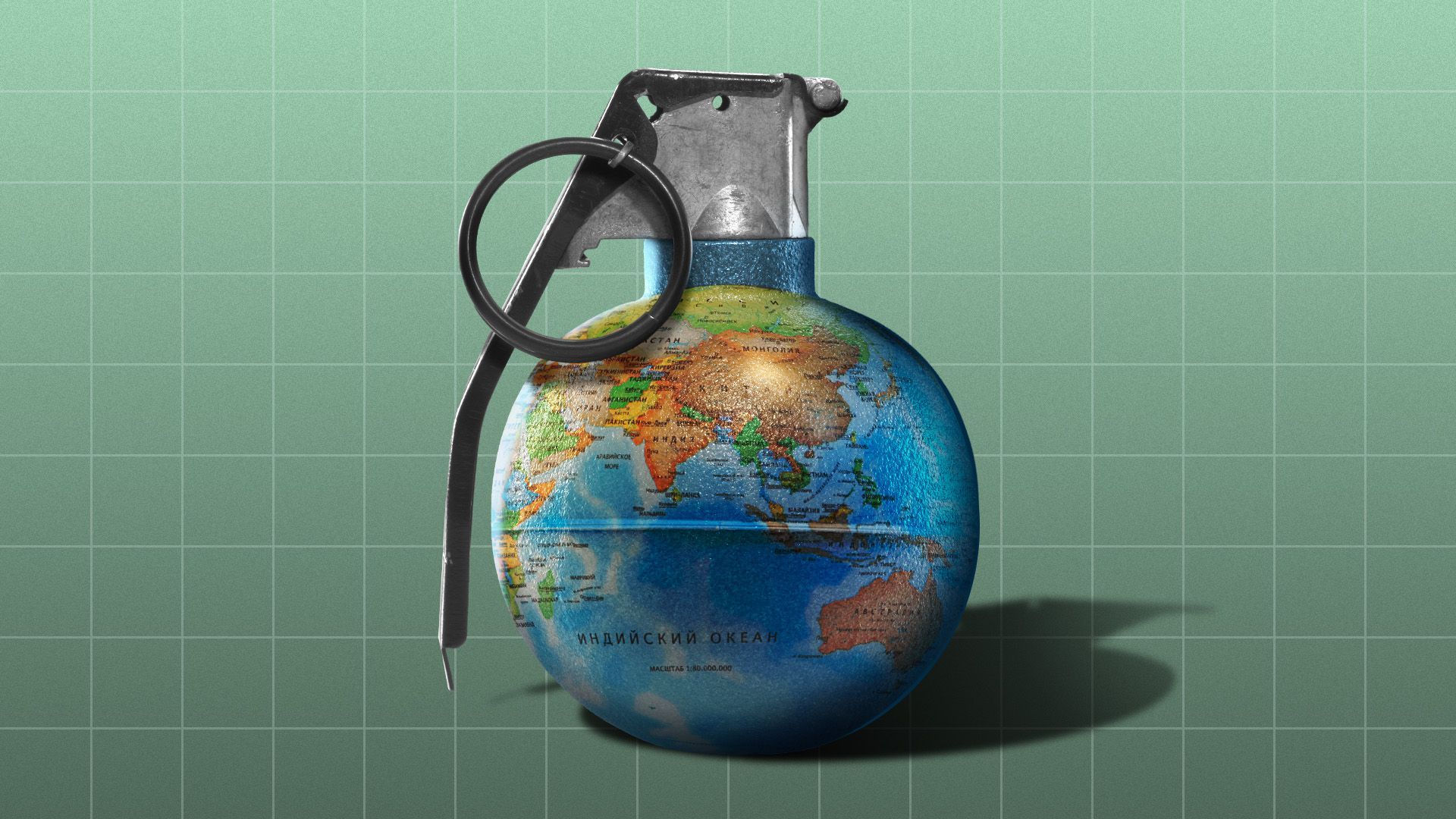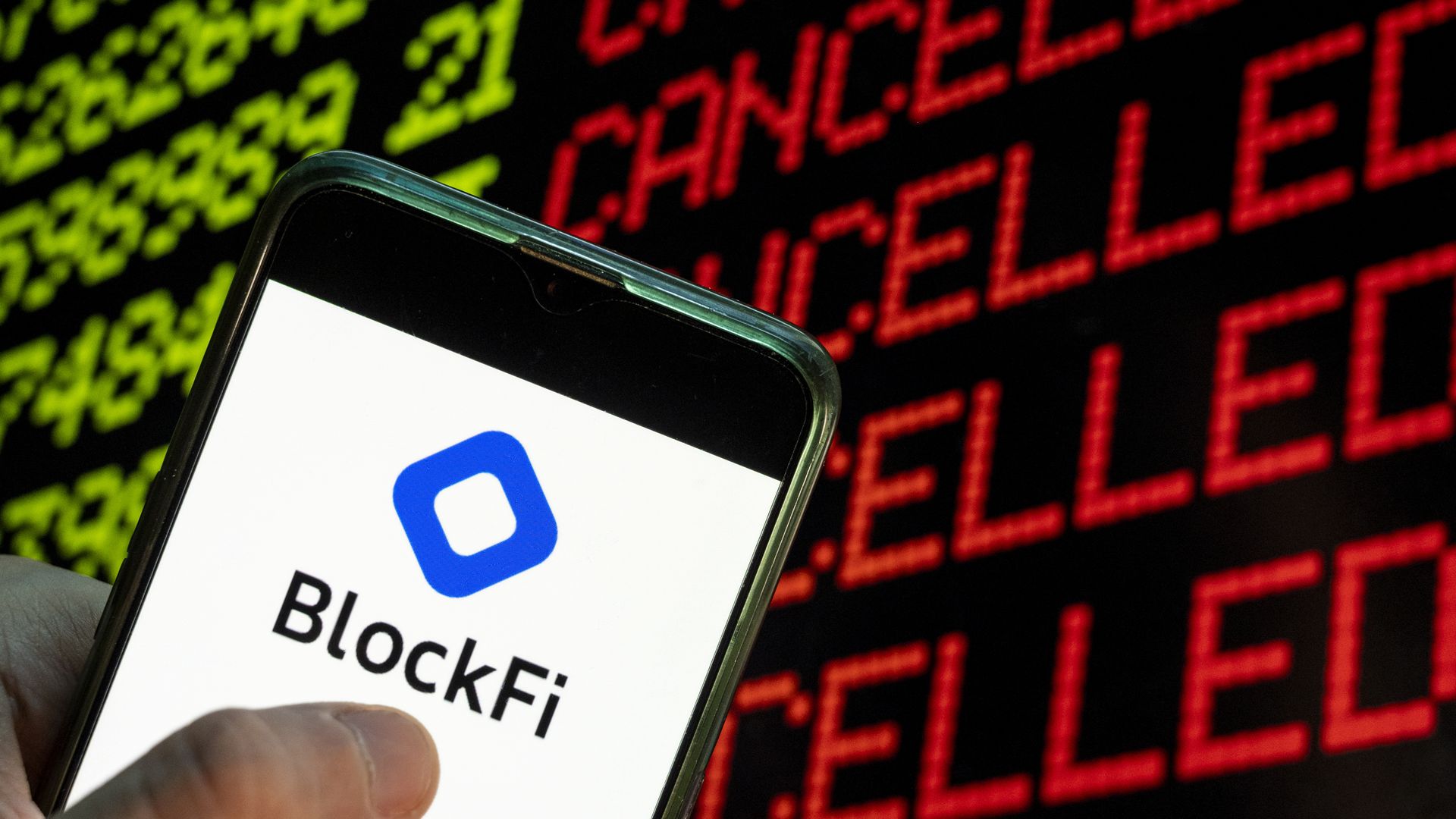| | | | | | | | | | | Axios Markets | | By Emily Peck and Matt Phillips ·Feb 15, 2022 | | 🍫☕️ Good morning! Emily here, nursing a bit of a chocolate hangover, tbh. Today, we'll explain how the Russia-Ukraine conflict is impacting markets. Plus, some crypto news if you read to the end. Let's do this... Today's Smart Brevity: 1,166 words, 4½ minutes. | | | | | | 1 big thing: Russia jitters |  | | | Illustration: Sarah Grillo/Axios | | | | Russia announced a partial pullback in Ukraine today, but the conflict is far from over, Matt writes. Why it matters: If there was a Russian invasion, there would not only be geopolitical shockwaves and human tragedy, but it also could upend markets and strain the global economy. - The largest country on earth by land mass, Russia is a commodities giant, ranking as a top producer of natural gas, oil, nickel, palladium, copper, coal, potash, wheat, and more.
- Disruptions to Russian exports — either at Russian President Vladimir Putin's say-so or due to sanctions — would drive up commodity costs, adding to global inflationary pressures and supply chain disarray.
State of play: Russia is the largest supplier of natural gas and crude to the European Union. - Oil prices briefly jumped above $96 a barrel on Monday — the highest since 2014 — as investors grew skittish about continued access to Russian crude.
- Natural gas is an issue too. Europe — particularly Germany — is most exposed should supplies of Russian natural gas stop flowing. More than 20% of Germany's gas flows from Russia, so a gas shutoff to the European economic and export giant could hurt growth and reverberate throughout global supply chains.
Yes, but: The impact of a disruption of Russian raw materials would be broader. It's difficult to predict how the dominoes would fall. Worth noting: High prices are also incentivizing American energy production. What we're watching: - Inflation: If oil prices hit $120 a barrel — as analysts think could happen if Russia invades — that could make the recent inflationary surge more long-lasting than economists now think. (Central banks are watching. More on that later.)
- Autos: An invasion could break another link in the rickety auto supply chain. Russia is the world's biggest supplier of palladium used in catalytic converters that scrub auto emissions.
- Wheat: Russia is the world's third-largest wheat producer — Ukraine too is a massive wheat farmer — and prices for the grain could spike on an invasion, even without major disruptions of shipments. (That's what happened during Russia's 2014 takeover of Crimea.)
- Aluminum: When Russian oligarch Oleg Deripaska — who controlled Russian aluminum producer Rusal — was sanctioned by the Treasury Department in 2018, it set off a 30% price surge.
The bottom line: A Russian invasion of Ukraine would complicate an already messy global economic picture. |     | | | | | | 2. Catch up quick | | 🎮💰Warren Buffett's Berkshire bought a $1 billion Activision stake just before the Microsoft deal. (Axios) 📞 The SEC is probing whether bankers tipped off hedge funds about block trades. (WSJ) 💵 The Trump Organization's accounting firm cut ties and said it can't stand behind the company's financial statements. (NYT) |     | | | | | | 3. Central bankers' bind |  Data: FactSet; Chart: Axios Visuals The prospect of armed conflict is already making markets jumpy. If it happens, it would also create a tricky situation for global central bankers, Axios' Neil Irwin writes. The big picture: International crises typically cause a flight to quality — meaning a massive inflow of money into safe assets. That would tend to drive the dollar up and interest rates on Treasury securities down. - Meanwhile, the Federal Reserve, European Central Bank, and other leading central banks will be reluctant to engage in monetary tightening at a time of geopolitical peril.
- In that sense, the Fed would want to move more gingerly as it considers how much to raise rates next month, and the ECB would be even more devoted to its current policy of gradualism in withdrawing easy money.
Yes, but: Armed conflict in Eastern Europe also threatens to make the advanced economies' inflation problem worse. That means the Fed and ECB would find themselves in the awkward position of backing off their anti-inflation measures at a time the pain of inflation is becoming more severe. - One countervailing effect: To the degree the flight to quality drives up the dollar, it would diminish inflationary pressure in the United States.
The bottom line: Look for central banks to try to cushion any economic damage from a Ukraine crisis — but to find themselves with little room to maneuver. |     | | | | | | A message from Axios | | Your insider look at who's moving markets | | |  | | | | Axios Pro delivers exclusive reporting and analysis from our all-new Pro newsroom. Why it matters: With decades of experience, Pro reporters provide scoops, analysis, and industry knowledge you'll only get from the smartest in the business. Try it free for two weeks. | | | | | | 4. Charted: War seems like a bad idea |  Data: FactSet; Chart: Axios Visuals Global stock markets slumped Monday as investors seemed sensibly perturbed by the idea of the largest European land war since 1945, Matt writes. Driving the news: Benchmark indexes in Europe and the U.S. suffered their third-straight decline on Monday. (They rebounded early Tuesday after Russia's statement that some troops were pulling back.) Why it matters: A potential Russian invasion of Ukraine adds to the headwinds investors were already facing to start the year from higher interest rates. - The S&P 500 dropped 0.4% in its third-straight drop. It's 8.2% below its Jan. 3 peak, and down 7.7% for the year.
- Major European indexes fared worse. Germany's DAX dropped 2% and France's CAC-40 fell 2.3%, in the third consecutive down day for both.
- The Nikkei 225 — Japan is an energy importer and vulnerable to high oil prices — also closed 2.2% lower.
Yes, but: Russian markets also dropped, with the RTS falling 3% and government bond prices falling sharply. Our thought bubble: Obviously the markets are not the most important thing in a situation like this, but they do underscore the point that a conflict in Ukraine will be costly, for combatants and onlookers alike. |     | | |  | | | | If you like this newsletter, your friends may, too! Refer your friends and get free Axios swag when they sign up. | | | | | | | | 5. About those crypto "savings accounts"... |  | | | Photo illustration: Budrul Chukrut/SOPA Images/LightRocket via Getty Images | | | | Markets sheriff Gary Gensler came for the crypto Wild West yesterday, cracking down on a particularly popular kind of product, the high-yield crypto "savings" account that really isn't a savings account at all, Emily writes. Driving the news: BlockFi, a crypto startup, said it will pay $100 million to settle allegations that it misled investors about its BlockFi Interest Accounts (BIA), where customers lend the company money in exchange for yield — up to around 8% in some cases. - It's the largest ever penalty against a crypto firm and latest sign that the Gensler-run SEC is serious about regulating this world.
Why it matters: Today's settlement puts the industry — and its customers — on notice that these kinds of accounts will be regulated as securities. - About 600,000 investors had crypto in BIA accounts for a total of $10.4 billion, according to the agency's filing.
State of play: Other startups, like Celsius and Gemini, offer similar products (and are also reportedly under SEC scrutiny). - These products are marketed as though they were savings accounts, where you deposit cash and earn interest.
- "Put your crypto to work," says the website advertising Gemini's lending product, called Earn. "You can receive 8.05% APY."
- With crypto booming, I've heard from investors who love these products and use them like high-yield savings accounts.
Yes, but: They're really more like risky high-yield bonds, essentially short-term loans customers make to crypto companies. - If there were a run on assets, BlockFi couldn't necessarily keep paying interest or even return customer's money, Axios' Hope King and Ryan Lawler explained.
Go deeper: SEC ratchets up crypto crackdown |     | | | | | | A message from Axios | | Your insider look at who's moving markets | | |  | | | | Axios Pro delivers exclusive reporting and analysis from our all-new Pro newsroom. Why it matters: With decades of experience, Pro reporters provide scoops, analysis, and industry knowledge you'll only get from the smartest in the business. Try it free for two weeks. | | |  | Bring the strength of Smart Brevity® to your team — more effective communications, powered by Axios HQ. | | | | | | Axios thanks our partners for supporting our newsletters. If you're interested in advertising, learn more here.
Sponsorship has no influence on editorial content. Axios, 3100 Clarendon Blvd, Suite 1300, Arlington VA 22201 | | | You received this email because you signed up for newsletters from Axios.
Change your preferences or unsubscribe here. | | | Was this email forwarded to you?
Sign up now to get Axios in your inbox. | | | | Follow Axios on social media:    | | | | | |












No comments:
Post a Comment